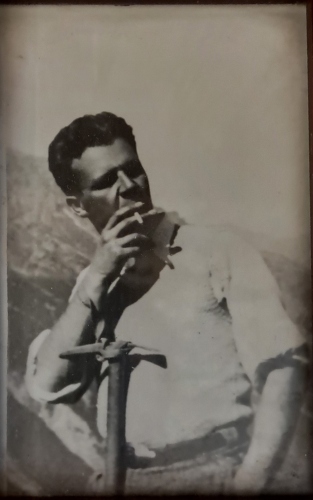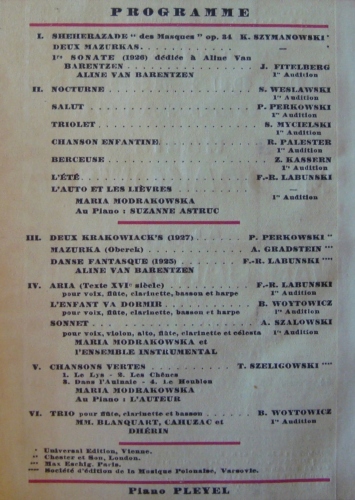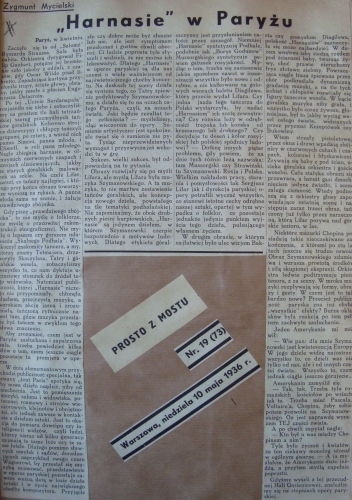His first attempts at composition come from 1919–1920, the only surviving piece among them being Waltz in D major for piano. His later, more mature juvenilia are pieces written when he was studying with Father Rizzi in Kraków and during this first few years as a student in Paris. Paris was also the place where Mycielski made his official debut as a composer.

Beginnings of professional activity
Zygmunt Mycielski wrote from an early age. He would note down events and his own reflections. He would try his hand at literature and painting. His youthful diaries are full of drafts of stories and poems, richly illustrated with drawings.
It was a concert of the Association of Young Polish Musicians and at the same time Maria Modrakowska’s first appearance in Paris. The Polish singer would soon conquer the French audiences, performing an international repertoire, including songs by her Polish colleagues. On 7 May 1931 the song Litość (Charity) was performed in Paris by Zofia Massalska accompanied by Mieczysław Mierzejewski. The performance was part of a concert of Polish music organised by the Institute of Slavic Studies of the Paris University in collaboration with the Polish-French Society for Literary-Artistic Exchange. In 1933 Mycielski wrote excitedly to his mother:
Modrakowska has shown my songs to her lords – the impresarios. They have accepted them and I’m going to be sung alongside the best things of contemporary music: "Marienleben" by P[aul] Hindemith and "Green [Songs]" by Szeligowski” (3/4 May 1933, Zygmunt Mycielski’s letters to Maria Mycielska, Jagiellonian Library).
Indeed, on 17 November 1933 in Paris Modrakowska, accompanied by Léon Kartun on the piano, performed Mycielski’s Gorzka zatoka and Gdzieżeście (listed in the concert programme as Deux Mélodies). Also in 1933, on 25 March, Paris heard Mycielski’s Piano Trio. His Four Preludes for Cello and Piano, written for the brilliant French cellist Maurice Eisenberg, was performed in 1934 in Vilnius (by local musicians: Albert Katz and Samuel Chones), where, in the spring of that year, the composer began to work at the local station of the Polish Radio.
Although Mycielski did not return to Poland for good until 1936, from 1933 he would spend quite long periods there and in 1934 he settled in Vilnius. He was welcomed there by Tadeusz Szeligowski, whom he had met earlier in Paris and who had invited him to work with him at the Polish Radio’s Vilnius station. Mycielski spent the following few months of that year in Vilnius, with a late spring break for a visit in Orniany, at the estate of Michał Tyszkiewicz (husband of popular singer, Hanka Ordonówna), where he composed Five Wedding Songs to words by Bruno Jasieński. While in Vilnius he also completed several other works, including the cello preludes. As part of his work for the radio, Mycielski would prepare various programmes, arrange music and with time also compose music of the radio theatre. He would write for newspapers and magazines increasingly frequently. According to Andrzej Szypuła, who has analysed a list compiled by the composer, in the inter-war period Mycielski’s articles appeared in Muzyka, Muzyka Polska, Gazeta Literacka, Conferencia, Pax, Zaułek, Kurier Wileński, Gazeta Artystów, Prosto z mostu, Arkady, Sprawy otwarte, Kurier Poranny, Muzyka współczesna, Ateneum (A. Szypuła, “Szkic do biografii Zygmunta Mycielskiego”, Kamerton 2012 no. 56). This demonstrates the breadth of Mycielski’s activity. He had liked writing since his childhood and now he was able to use it as an increasingly certain source of income.
He returned to Paris, where he was elected President of the Association of Young Polish Musicians. On 31 January 1935 he organised a concert during which Maria Modrakowska sung his Five Wedding Songs for the first time (this time she was accompanied by Nadia Boulanger on the piano). The programme also featured works by other Polish composers: Antoni Szałowski, Tadeusz Szeligowski, Alfred Gradstein, Roman Maciejewski and Jerzy Fitelberg, as well as compositions by Mikołaj Zieleński and Claudio Monteverdi. Mycielski’s songs scored the biggest success and were appreciated by the French critics.
He divided his time between Paris and Montrésor, where for years he had been a regular guest at the castle of Anna Branicka, a relative of the Mycielskis. He liked to compose there. This was the period when he wrote Three Songs to Words by Petronius for voice and piano, which he dedicated to Marcelle de Manziarly, a fellow student who soon became a close friend, as well as the ballet Narcissus. It was written during the preparations at the Paris Opera for the premiere of Karol Szymanowski’s Harnasie [The Highland Robbers]. Mycielski took part in these preparations. He talked with Serge Lifar, who performed the main role of Harnaś, about a possible performance of Narcissus. However, soon after the premiere of Szymanowski’s ballet Mycielski decided to return to Poland. When he thought about it years later, he wrote:
What is astonishing about this is the constant running away from people and opportunities, not finishing anything decently, such as the opportunities with the ballet ("Narcissus"), and Lifar and the Archives Internationales de la Danse, although this matter was really going well at the time. Lifar, Rolf de Maré and Rouché were to have listened to an arrangement for two pianos, but I left for Poland and did not make that arrangement. Of course, I had no money left for Paris – foreign currency problems – but with a right dose of energy... (9 January 1963, in Z. Mycielski, "Dziennik 1960–1969", Warsaw 2001).
Mycielski again went to Vilnius, but in the summer of 1937 he moved to Warsaw, where he became a regular music reviewer for Kurier Poranny. In the spring of 1938 he moved to Bukowina Tatrzańska, where he wanted to focus on creative work. But he did not compose much. Although he made a draft for a symphonic piece, the only work he completed was the song to Reiner Maria Rilke’s words Stimme eines jungen Bruders for soprano and piano. He was going through some spiritual dilemmas and wondered what to do next in life. However, all plans were put on hold by the outbreak of the Second World War.






